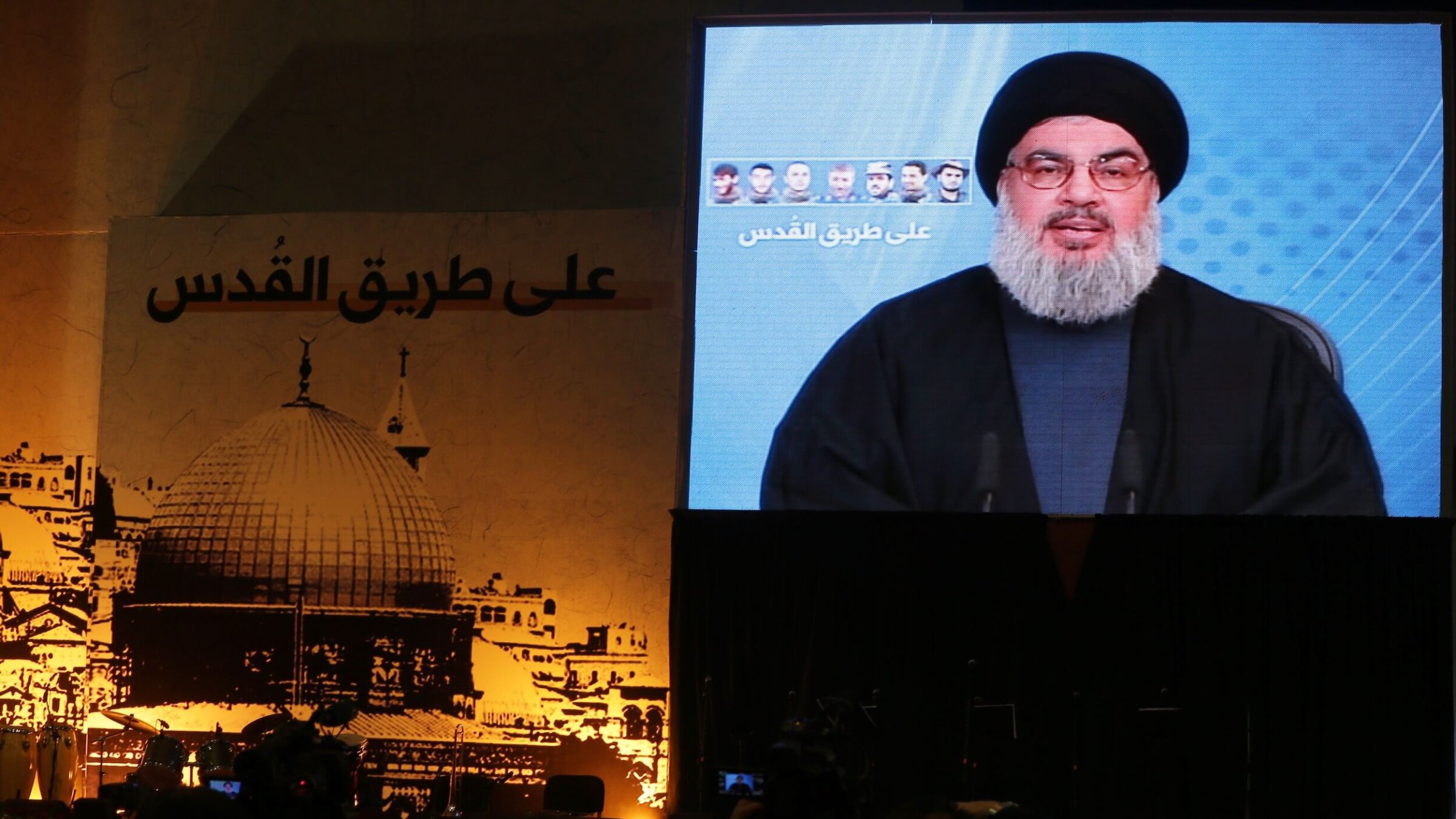With killing of Hezbollah’s chief, Israel occupies the inarguable moral high ground
Nothing is black-and-white in the Middle East — except, perhaps, the assassination of Hassan Nasrallah

Hassan Nasrallah, the head of Hezbollah whom Israel killed in a Friday airstrike, addressed supporters via a giant screen in Beirut in 2014. Photo by Joseph Eid/AFP via Getty Images
In a conflict-ridden region where ethical clarity is often elusive, Israel doesn’t frequently find itself holding an obvious moral high ground.
Today is different. By assassinating Hezbollah’s chief, Hassan Nasrallah, it has done the world, and in particular the Lebanese people, an unequivocal favor. However problematic assassinations may be as a tool, Nasrallah’s death isn’t just a critical strategic accomplishment for Israel: It marks a major move forward in helping to free Lebanon of Hezbollah’s reign of terror.
Let there be no doubt: there are celebrations right now all over Lebanon. I have many friends there, after overseeing the Associated Press’s coverage of the country for years. I know for a fact that no matter how the Lebanese may feel about Israel, this is one development that the majority of them are happily welcoming.
Hezbollah arose in the 1980s as a tool of Iran to create mayhem in the already brittle landscape of Lebanon, a multi-ethnic society that had been brutally torn apart by a civil war that broke out in 1975. Since then, the group has become the largest non-state military in the world, often with devastating consequences for Lebanon. Under Nasrallah’s leadership for more than three decades, the group repeatedly launched unprovoked attacks on Israel, bringing ruin upon its people.
For bad measure, it also intervened in the Syrian civil war — a conflict that has led to the deaths of more than 580,000 people — to keep the war criminal Bashar al-Assad in power. That war also further destabilized Lebanon, saddling the country with more than a million refugees and helping lay the groundwork for the country’s current economic crisis.
Israel habitually mires itself in conflicts where accusations of disproportionate force cloud international opinion, none more intensely than its current war in Gaza, which has killed more than 40,000 Palestinians (an estimated third of them armed militants). But in the Lebanese arena, the balance of right and wrong is clear — and clearly on Israel’s side. Israel has for the past year been on the receiving end of Hezbollah’s aggression, with its civilians bombarded by rockets, its borders threatened, and its very existence challenged by an organization that was planning an Oct. 7-style invasion.
Of course, it’s not yet clear whether Hezbollah will prove to be fundamentally degraded by Nasrallah’s death, or simply weakened. Assassinations are well understood to be a risky bet, especially when it comes to highly ideological and potentially suicidal terrorist groups; there is, after all, always a replacement waiting in the wings. Indeed, Nasrallah rose to the top after Israel’s assassination of his predecessor, Abbas Musawi, in 1992.
But unlike then, today the second tier of command in the group has been decimated in recent months by Israeli efforts, including last week’s pager attack and an impressive series of lower-level assassinations. Nasrallah leaves no clear successor. Instead, his death may provide a ray of hope: He was the architect of Hezbollah’s promise to keep firing at Israel as long as its war against Hamas continues. With him personally gone, it will be easier for the group to back away from that pledge, which has helped push the region to the brink of widespread war.
Plus, the 64-year-old Nasrallah — who was actually a cleric — wasn’t just a military leader. He was the face of Hezbollah’s movement, the organization’s most powerful symbol, singularly able to rally its base and unify disparate factions. His fiery speeches, delivered in classical Arabic peppered with Lebanese colloquialisms, made him a media icon across the Arab world. Lebanon may find it easier to find a way to reclaim sovereignty over its south — as well as other areas that Hezbollah has effectively controlled for decades — now that it will no longer need to combat his cult of personality.
But it will certainly need help. Israel’s strike has provided an opening the world community must seize, by taking concrete and decisive steps to implement multiple longstanding United Nations Security Council resolutions calling for Hezbollah to pull back from the border with Israel and be disarmed.
That’s particularly true given that Nasrallah’s death could prove a pivot point for the entire Middle East. It carries significant implications for Iran, which has long used Hezbollah as its primary proxy in the region. Hezbollah has been central to Iran’s strategy of encircling Israel with hostile forces — in Lebanon, Gaza and the West Bank, and Yemen, through the Houthis. Nasrallah’s killing, particularly following on the heels of Israel’s July assassination of top Hamas leader Ismail Haniyeh in Iran, is a reminder to Iran that its most prized proxies are not invincible — and raises the question of whether its own leadership might be similarly vulnerable.
For decades, groups like Hezbollah, Hamas and the Houthis have perpetuated cycles of violence, bringing endless conflict, poverty and ruin in their wake. They have hijacked national movements, turning them into instruments of Iran’s geopolitical ambitions. These groups, operating outside of state control, have inflicted immense suffering on their own populations.
The time has come to stop tolerating all of this. Nasrallah’s death should kickstart efforts to comprehensively change the status quo.






















